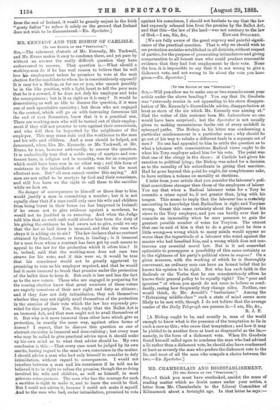I TO MB EDITOR OF TIM"SPECTATOR."] SiR,—Will you allow me
to make one or two remarks anent your article under the above heading ? You say that Dr. Goodwin was " extremely remiss in not appending to his stern disappro- bation of Mr. Kennedy's discreditable advice, disapprobation at least as stern of the sin which Mr. Kennedy was aiming at." Had the writer of this sentence been Mr. Labouchere no one would have been surprised; but the Spectator is not usually given to making mountainous faults out of every molehill in episcopal paths. The Bishop in his letter was condemning a particular misdemeanour in a particular man ; why should he go out of his way to rebuke a different fault in a separate set of men ? No one had appealed to him to settle the question as to what a labourer with conscientious Radical views ought to do when his Tory employer asked him for his vote. The point was- that one of the clergy in the diocect. of Carlisle had given his sanction to political lying; the Bishop was asked for a decision as to the morality of his subordinate in giving that sanction. Had he gone beyond this point ho ought, for completeness sake, to have written a volume on morality at elections.
I infer from your article that you consider the labourer's poli- tical convictions stronger than those of the employers of labour You say that when a Radical labourer votes for a Tory he commits a crime equal to, if not greater than, lying with his. tongue. This seems to imply that the labourer has a certainty amounting to knowledge that Radicalism is right and Toryism wrong. Grant this same certainty about the rightness of his• views to the Tory employer, and you can hardly aver that he commits an immorality when he uses pressure to gain the greatest possible number of votes for Toryism. The utmost that can be said of him is that to do a great good he does a little wrong,—a wrong which to many minds would appear no worse than the ingratitude of a labourer who voted against the master who had benefited him, and a wrong which does not con- travene any essential moral law. But is it not somewhat optimistic to presuppose a possibility of this same certainty as to the rightness of his party's political views in anyone? On a given measure, with the working of which he is thoroughly conversant, an ordinary man can have an honest belief that he knows his opinion to be right. But who has such faith in the Radicals or the Tories that he can conscientiously affirm he knows their general policy to be equally right? The "poor and ignorant " of whom you speak do not seem to believe so confi- dently, seeing how frequently they change sides. Neither, one would think, do Mr. Arnold's " barbarians." Among the "Hebraising middle-class" such a state of mind seems more likely to be met with, though I do not believe that the average reader of the Daily Telegraph can possess it.—I am, Sir, &c.,
R. J. F.
[A Bishop ought to be, and usually is, man of the world enough to know what is the pressure of the temptation to lie in such a case as this ; who cause that temptation ; and how it may be yielded to in another form at least as disgraceful as the lie,— namely, in the form of a dishonest vote. When Dr. Goodwin found himself called upon to condemn the man who had advised a lie rather than a dishonest vote, he should also have condemned at least as severely the man who prefers the dishonest vote to the lie, and moat of all the man who compels a choice between the two.—ED. Spectator.]


































 Previous page
Previous page